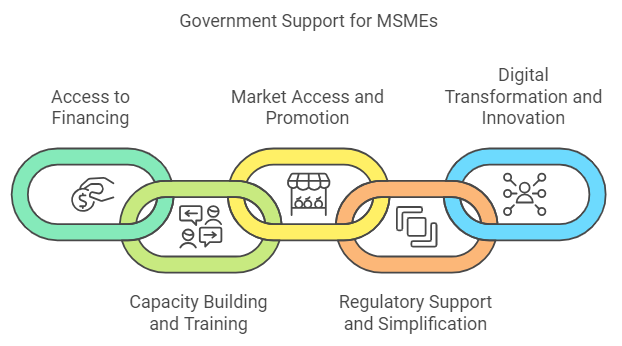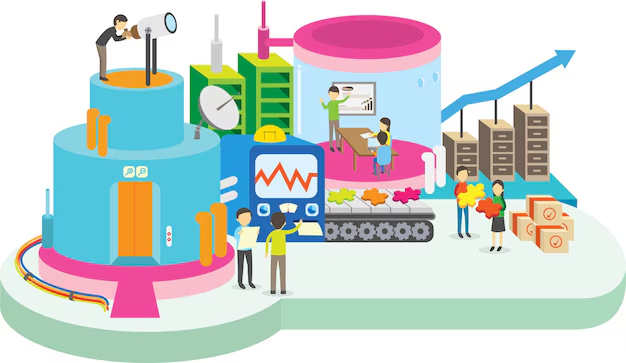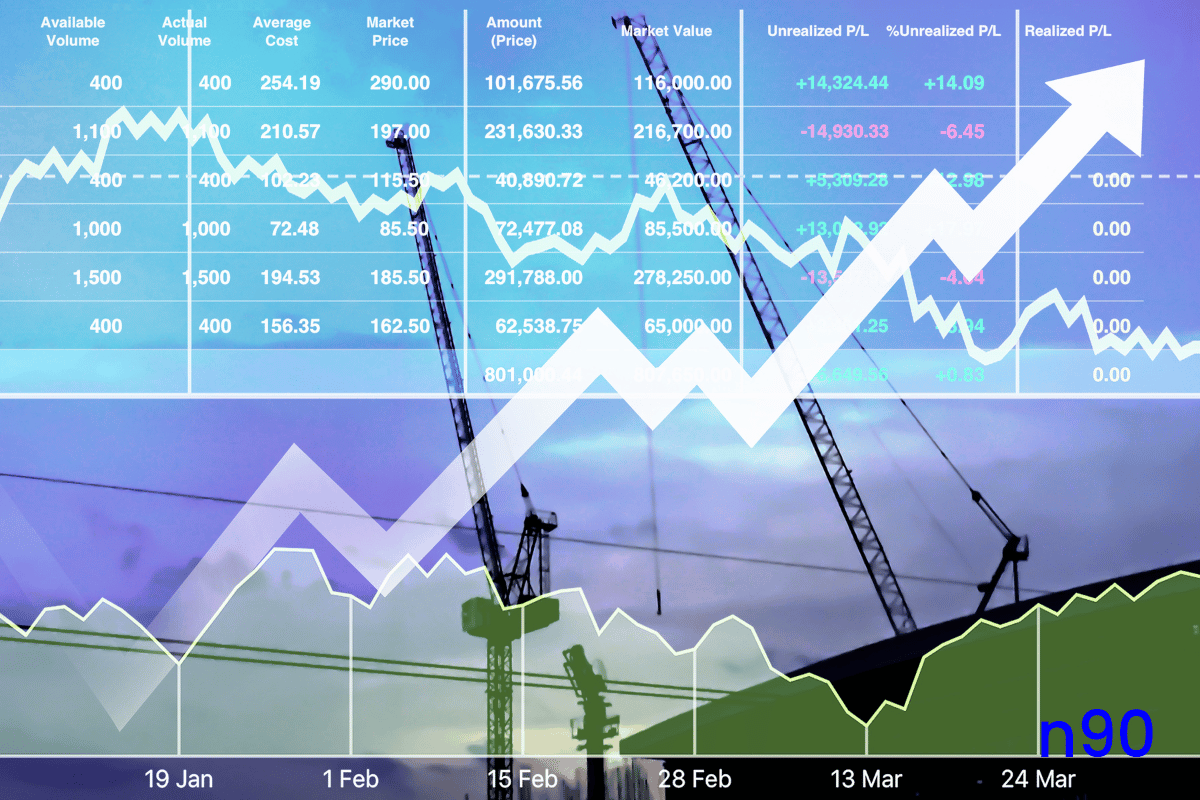MSMEs, or Micro, Small, and Medium Enterprises, are often heralded as the backbone of many economies worldwide, especially in countries like the Philippines. The challenge for these enterprises lies in navigating through the complex landscape of available incentives and support systems that enable and promote their growth.
In this blog, we will explore the intricate classifications within the MSME sector, shedding light on how these classifications impact government support structures and business operations.
From their critical role in job creation and GDP contributions to the specific government initiatives that support them, this article will also offer a comprehensive overview that will help MSME owners and stakeholders understand the full spectrum of opportunities and challenges they face in the Philippines.

Importance of MSMEs To The Philippine Economy

MSMEs are a cornerstone of the Philippine economy. They drive job creation, encourage innovation, and contribute significantly to economic growth.
Their widespread presence across the country ensures that economic development benefits are shared more equitably, making MSMEs indispensable in pursuing inclusive and sustainable economic progress in the Philippines.
Here are some key reasons why MSMEs are vital to the Philippine economy -
1. Employment Generation
MSMEs account for a significant portion of employment in the Philippines, providing jobs to millions of Filipinos. They are crucial in absorbing the labor force, particularly in rural and underdeveloped areas, helping to reduce unemployment and underemployment.
2. Economic Contribution
MSMEs contribute substantially to the country’s Gross Domestic Product (GDP), around 40%. Producing goods and services refreshes economic activity across various sectors, from agriculture and manufacturing to retail and services.
3. Promoting Inclusive Growth
MSMEs are spread across the country, including in remote and rural areas, making them key players in promoting inclusive economic growth. They help bridge the income gap and support regional development, ensuring economic benefits reach more Filipinos.
4. Innovation and Competition
MSMEs are often at the forefront of innovation, bringing new products, services, and business models to the market. Their presence encourages competition, which drives larger businesses to improve efficiency, reduce costs, and innovate, ultimately benefiting consumers.
5. Supporting Large Enterprises
MSMEs form a crucial part of the supply chain for larger companies, providing goods, services, and raw materials. Their flexibility and responsiveness allow them to meet the specific needs of larger enterprises, enhancing the economy's overall productivity and competitiveness.
6. Resilience and Adaptability
MSMEs are often more adaptable and resilient than larger companies, quickly adjusting to changes in the market or economic environment. This agility helps them survive and thrive in challenging times, contributing to the overall stability of the economy.
7. Entrepreneurship and Innovation
MSMEs promote a culture of entrepreneurship, encouraging individuals to start their businesses and bring innovative ideas to life. This entrepreneurial spirit drives individuals forward and creates new opportunities for growth and development.
Also Read: What is Invoice Financing, and How Does it Work?
Government Support for MSMEs in The Philippines
The Philippine government has introduced various support mechanisms tailored to their unique needs to ensure these enterprises can thrive, and these initiatives range from financial assistance and training programs to regulatory reforms and market access opportunities.
By actively supporting MSMEs, the government aims to foster a more resilient and inclusive economy, enabling these businesses to grow, compete, and significantly contribute to the nation's economic advancement.
Here are some of the critical areas where the government supports MSMEs in the Philippines -

1. Access to Financing
The government offers various loan programs with favorable terms to MSMEs through agencies like the Small Business Corporation (SBCorp) and the Development Bank of the Philippines (DBP).
These programs provide working capital, support business expansion, and help MSMEs recover from economic setbacks. Initiatives like the Pondo sa Pagbabago at Pag-asenso (P3) program offer low-interest loans tailored to small businesses.
2. Capacity Building and Training
The Department of Trade and Industry (DTI) provides extensive training and capacity-building programs for MSMEs through its nationwide Negosyo Centers.
These centers offer workshops, seminars, and mentoring sessions on business management, financial literacy, marketing, and digitalization. The aim is to equip MSMEs with the skills and knowledge necessary to compete effectively in the market.
3. Market Access and Promotion
To help MSMEs expand their market reach, the government supports initiatives like Go Lokal! and the One Town, One Product (OTOP) program. These programs provide MSMEs with platforms to showcase their products in local and international markets, increasing their visibility and sales potential.
The DTI also assists in organizing trade fairs and export promotion activities that connect MSMEs with potential buyers and partners.
4. Regulatory Support and Simplification
The government has implemented reforms to simplify business processes and reduce bureaucratic hurdles for MSMEs. The Ease of Doing Business Act aims to streamline the registration, licensing, and permitting processes, making it easier for MSMEs to start and operate their businesses.
Additionally, initiatives like the Barangay Micro Business Enterprises (BMBE) Law provide tax exemptions and other incentives to encourage the formalization and growth of small businesses.
5. Digital Transformation and Innovation
Recognizing the importance of digitalization, the government supports MSMEs in adopting new technologies and digital tools. Programs like the DTI’s “Digitalization of MSMEs” initiative provide training on e-commerce, digital marketing, and online payment systems, helping businesses enhance their competitiveness in the digital economy.
The government also encourages innovation through grants and support for research and development.
6. Crisis Support and Recovery Programs
In response to crises such as natural disasters or the COVID-19 pandemic, the government has rolled out targeted support programs to help MSMEs recover and rebuild.
These include financial assistance, wage subsidies, and grants to sustain operations and retain employees during challenging times. Programs like the COVID-19 Assistance to Restart Enterprises (CARES) aim to provide emergency funding and recovery support to affected businesses.
Also Read: How to Sell Your Invoices to Improve Cash Flow
Expand your business with confidence. Apply for N90’s fast financing solutions and get loan approvals within 24 hours! Get access to the funds your Philippine SME needs to thrive! Apply Today!
Sectors Categorized Under MSME in The Philippines

The Micro, Small, and Medium Enterprises (MSMEs) sector in the Philippines spans many activities, significantly contributing to the nation's economy and fostering inclusive growth.
Here, take a closer look at the industries that are categorized as MSMEs in the Philippines -
1. Textiles
Textiles sector MSMEs create clothing, fabrics, and other textile products. These MSMEs range from small-scale garment factories to home-based tailoring services and play a pivotal role in satisfying local demand and export markets.
Small weaving and knitting businesses contribute to the fascinating array of fabrics produced in the country, championing both traditional and modern designs.
2. Food Processing
The food processing sector involves transforming raw ingredients into consumable food products. MSMEs in this industry create baked goods, canned goods, and various packaged food items. Small bakeries and specialty food manufacturers, such as those making artisanal cheeses or organic jams, are prime examples.
These businesses satiate local appetites and cater to niche markets that demand unique, high-quality food products.
3. Leather Products
MSMEs in this category in the Philippines specialize in crafting a wide range of goods, including bags, shoes, belts, wallets, and accessories. These enterprises often focus on quality craftsmanship, using locally sourced materials to create durable and stylish products.
Many of these MSMEs combine traditional techniques with modern designs to cater to local and international markets. In the process, they play a significant role in sustaining the leather industry, providing employment, and promoting Filipino craftsmanship.
4. Furniture and Wood Products
In this sector, MSMEs create furniture, woodcraft items, and other wood products, and small-scale furniture makers and home-based woodwork services take center stage. They produce anything from intricately carved hardwood furniture to simple, functional pieces.
Their contributions help maintain a rich woodworking tradition while meeting modern demands for design and sustainability.
5. Metal and Engineering Products
In this sector, MSMEs manufacture machinery, tools, and other metal goods, and small-scale metal fabrication shops and machine repair services operate in joint ventures.
These enterprises are crucial for industrial support, providing custom-made tools and machinery parts, often catering to the specific needs of local industries.
6. IT Services
The IT sector within MSMEs offers many services, including software development, data processing, and technology support. Companies in this category range from small software development firms to home-based IT consultants.
These businesses help drive technological innovation and efficiency, critical in modernizing various sectors.
7. Tourism
Tourism-related MSMEs include travel agencies, tour operators, and accommodation providers, and small-scale tour operators and home-based bed-and-breakfast services are typical examples.
These businesses help showcase the Philippines' rich cultural heritage and natural beauty, attracting tourists domestically and internationally.
8. Healthcare
MSMEs provide medical services, pharmaceuticals, and health-related products in the healthcare sector, and a few examples include small medical clinics, specialty pharmacies, and home-based healthcare services like medical transcription.
These enterprises are essential in making healthcare accessible and affordable, especially in underserved areas.
9. Education and Training
MSMEs in the education and training sector offer services such as language schools, vocational training centers, and home-based tutoring. These businesses are vital in nurturing skills and knowledge, aiding community development, and providing opportunities for lifelong learning.
10. Creative Industries
This sector involves MSMEs producing creative goods and services, such as graphic design, photography, and artistic services, and small graphic design studios and freelance artists are a few examples of this sector.
These businesses drive cultural enrichment and innovation, providing unique products and services that cater to diverse aesthetic tastes.
Also Read: Creating A Cash Flow Budget In 5 Steps
Examples of MSME Businesses Operating in The Philippines

MSMEs span a wide range of industries, from food and retail to manufacturing and services, reflecting the diverse and dynamic nature of the country’s entrepreneurial landscape. In the Philippines, they often start small, serving local communities, but many have the potential to grow and scale significantly.
Here, let us explore some prime examples of MSME businesses of various domains operating in the Philippines -
Manufacturing Examples
- Leather Products Examples Canvas Shoes: These are widely manufactured by small-scale units due to their high demand and relatively simple production process.
- Leather Garments: MSMEs produce a variety of leather clothing, from jackets to gloves.
- Leather Sandals and Chappals: These are trendy in regions with strong cultural ties to traditional footwear.
- Eco-Friendly Shoe Upper Leather: Some MSMEs specialize in sustainable leather options to reflect the nation’s growing environmental consciousness.
- Upholstery Leather: This is used in furniture, automotive interiors, and other high-value applications.
- Portfolio Bags & Leather Waist Belts: These accessories blend craftsmanship and utility, offering lucrative opportunities for MSMEs.
IT and Software Examples
The IT sector is a hotbed for MSME activity, driven by constant innovation and the digital transformation of businesses worldwide.
- Mobile App Development Companies: These create innovative applications for diverse client needs.
- Cybersecurity Services Providers: Small firms offer specialized services to protect data and infrastructure.
- E-commerce Platforms: They help businesses go online and expand their reach.
- Software Development Firms: They specialize in artificial intelligence, data analytics, or cloud computing niches.
- IT Consulting Firms: They offer expert advice, which is often vital for other MSMEs.
- Digital Payment Gateways: They enable businesses and consumers to make secure online transactions.
Tourism and Hospitality Examples
This sector thrives on small-scale enterprises that offer personalized and unique experiences to travelers.
- Bed and Breakfast Establishments: They provide cozy, personalized lodgings.
- Tour Operators: Specialize in local tours showcasing cultural or natural attractions.
- Event Management Companies: These small firms plan and execute social and corporate events.
- Catering Services: Offer customized food services for events and gatherings.
- Homestay Providers: Enable travelers to experience local culture firsthand.
Education and Healthcare Examples
Both essential sectors harbor numerous MSMEs that provide people with in-depth education and top-of-the-line healthcare facilities.
- Private Tutoring Services: They offer personalized educational assistance.
- Online Course Providers: These deliver diverse learning modules across various subjects.
- Healthcare Clinics & Medical Diagnostic Centers: Provide essential health services in local communities.
- Wellness Centers & Yoga Studios: Promote holistic health and wellness through various programs and activities.
Retail and Wholesale Trade Examples
Retail and wholesale trade hosts numerous MSMEs, each bringing unique products to market and meeting local demand.
- Convenience Stores: These small retailers offer essential goods, providing convenience to local communities.
- Specialty Food Stores: Focus on niche products like organic or gourmet foods.
- Fashion Boutiques: Sell unique and often locally designed apparel.
- Online Marketplaces: Enable local artisans and small producers to sell their products to a broader audience.
Electronics and Engineering Examples
In electronics and engineering, MSMEs significantly contribute through innovation and specialized products.
- Manufacturers of Printed Circuit Boards (PCBs): Essential components for almost all modern electronic devices.
- Suppliers of Electronic Components: Provide capacitors, resistors, and semiconductors critical for various applications.
- Companies in Robotics and Automation: Pioneer new technologies to improve industry efficiency.
- Producers of Renewable Energy Systems: Manufacture solar panels and other components crucial for sustainable energy solutions.
Also Read: How to Finance an Existing Business: Guide to Business Loans
Types of Enterprises Categorized Under MSME in The Philippines
Let's dive into the various types of Micro, Small, and Medium Enterprises (MSMEs) that play a pivotal role in the Philippines’ economy.
1. Manufacturing
This category includes businesses that create tangible goods. These enterprises range from textile and garment manufacturing to food processing, leather production, engineering, fabrication, pharmaceuticals, and chemicals.
Manufacturing MSMEs are significant because they can cater to local and international markets, thus enhancing trade and industrialization in the Philippines.
2. Handicrafts and Artisanal Work
Unique and culturally rich, this sub-sector is dominated by skilled artisans who produce handmade items such as pottery, jewellery, and textiles. These products often carry a cultural significance and possess a distinct charm that mass-produced goods cannot replicate.
3. Agro-based Industries
Agro-based MSMEs utilize agricultural raw materials to process and create products like flour, rice, and oil. These enterprises add value to farm produce and ensure a steady market for farmers, promoting agricultural sustainability.
4. Electronics and Electrical Goods
In the technological era, enterprises manufacturing electronic components for automobiles, transformers, and motors have a crucial role in keeping the industry dynamic and evolving. Such MSMEs are essential for the advancement of technology and infrastructure.
5. Paper and Paper Products
Paper MSMEs produce various products, including paper printing, stationery, and packaging materials. These businesses address diverse needs in educational institutions, offices, and packaging industries and promote sustainable materials.
6. Consulting, Management, and Placement Services
Consulting firms, management services, and placement agencies enable businesses to operate efficiently by offering expert advice, effective management strategies, and matching talent with opportunities.
7. Educational Services
This includes institutions and training centers that offer education and skill development, thus contributing to the nation's intellectual and skill capital.
8. Healthcare Services
From hospitals and clinics to wellness centers, these MSMEs ensure the community's well-being by providing access to essential health services.
9. Financial Services
Financial institutions and banks under MSMEs offer crucial financial products and services supporting individuals and businesses in managing funds and investments.
10. Security Services
Security agencies and surveillance services provide necessary security solutions to ensure the safety of individuals, homes, and businesses.
11. Transportation and Logistics Services
These services include local delivery providers and small trucking companies, crucial for supply chain management and efficient transportation of goods.
12. Construction and Real Estate Services
Small construction firms and local property developers contribute to infrastructure development and housing solutions, playing a vital role in urban development.
13. Retail Services
This includes local shops and online stores, which are essential for providing the community with everyday goods and services.
14. Energy and Environment Services
Enterprises in this sector focus on energy efficiency, renewable energy solutions, and waste management, promoting sustainable and environmentally friendly practices.
15. Media and Entertainment Services
From advertising agencies and event management companies to film and video production services, these MSMEs cater to the growing demand for creative services and entertainment.
Also Read: Legalities and Operations of Online Lending in the Philippines
Types of Sectors Excluded From The Category of MSME in The Philippines

While the MSME sector in the Philippines extensively covers a broad spectrum of activities, some industries are expressly excluded from its purview. Knowing these exclusions helps clarify the boundaries within which MSMEs operate and ensures that the support provided is directed accurately toward eligible businesses.
Here, take a closer look at sectors excluded from the category of MSME in the Philippines -
1. Gambling and Casino Exclusion
Gambling and betting activities are among the notable exclusions. The exclusion aims to maintain the sector's alignment with ethical and regulatory standards because gambling and casinos involve high-risk financial activities that do not align with MSMEs' traditional objectives and support structures.
2. Forestry and Wood Harvesting Exclusion
Another significant exclusion is forestry and logging activities. Due to its unique nature and distinct regulatory environment, this sector is not considered part of the MSME sector.
Forestry and wood harvesting involve large-scale, long-term investments and environmental considerations that differ from the typical MSME model designed for smaller, more agile businesses.
3. Fishing and Aquaculture Exclusion
Fishing and aquaculture are also excluded from the MSME classification. Like forestry, these industries require substantial capital investment and are subject to specific environmental regulations.
Moreover, they also involve prolonged periods of return on investment and are heavily dependent on natural conditions, making them distinct from the traditionally quicker turnover and relatively lower capital needs of MSMEs.
4. Domestic Staffing Exclusion
Domestic staffing and household services are also excluded. While critical, these services fall outside the scope of what MSMEs are meant to support.
This sector predominantly features informal employment structures and needs the scalable business framework that MSMEs are intended to develop and enhance.
Conclusion
The MSME sector provides opportunities for both new and experienced entrepreneurs, as these enterprises play a crucial role in job creation, innovation, and overall economic growth, acting as development engines.
For aspiring entrepreneurs, the MSME sector is a fertile ground for ambition and innovation because the range of opportunities available here is extensive, from niche markets to mainstream industries. Engaging in this sector means establishing a business and contributing significantly to national economic growth.
Moreover, as this article has shown, starting an MSME requires a clear vision, determination, and a problem-solving mindset rather than massive capital or infrastructure. The government offers a plethora of support mechanisms, including financial incentives, training programs, and well-structured policies dedicated to nurturing MSMEs.
Frequently Asked Questions (FAQs)
1. What are the typical MSME businesses in the Philippines?
MSME stands for Micro, Small, and Medium Enterprises. In the Philippines, these businesses are categorized based on their total assets and number of employees.
Some typical MSME businesses include the following -
- Retail: Grocery stores, convenience stores, and online retail.
- Manufacturing: Food processing, electronics, and textiles.
- Services: Business services, transportation, and hospitality.
- Construction: Building construction, infrastructure projects, and home renovations.
- Agriculture: Farming, livestock raising, and fisheries.
2. What is an example of a micro business in the Philippines?
In the Philippines, a micro business is a small enterprise that typically employs fewer than 10 people and has total assets below a certain threshold.
An example of a micro business could be a small sari-sari store (convenience store), a home-based bakery, or a one-person tailoring shop. These businesses often operate on a smaller scale and serve local communities.
3. Is MSME the backbone of the Philippines?
Yes, MSMEs are often considered the backbone of the Philippines because they create a significant number of jobs, almost 99.5%, contribute substantially to the economy, around 40% of the country’s GDP, and play a vital role in supporting local communities by employing 60% of the available workforce.
4. What is the MSME law in the Philippines?
The MSME Law in the Philippines refers to Republic Act No. 9501, also known as the "Magna Carta for Micro, Small, and Medium Enterprises (MSMEs)." This law was enacted to promote, support, and develop MSMEs in the Philippines, recognizing their critical role in economic growth, job creation, and poverty alleviation.













